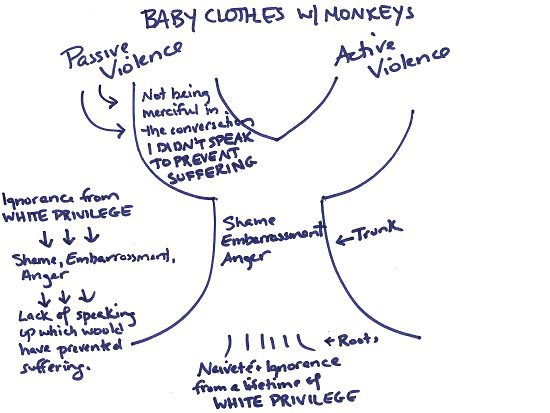 The following post is by my colleague, Shams Tara Wesley, Acupuncture Physician. Shams is co-facilitating the program for Healing Racism & Bigotry. You’ll be hearing a lot from her during this 4-week program which began on August 10th, God willing. She’ll be on the livestream calls, interacting with you in the facebook group for the program and contributing regular posts. Thank you for joining us for any part of this program. You are welcome to participate in any way you feel called. Please read on…”
The following post is by my colleague, Shams Tara Wesley, Acupuncture Physician. Shams is co-facilitating the program for Healing Racism & Bigotry. You’ll be hearing a lot from her during this 4-week program which began on August 10th, God willing. She’ll be on the livestream calls, interacting with you in the facebook group for the program and contributing regular posts. Thank you for joining us for any part of this program. You are welcome to participate in any way you feel called. Please read on…”
Hi all! I pray that you’re enjoying this wonderful Friday and feeling the freedom of the upcoming weekend.
What Is Interpersonal Violence?
Yesterday I posted about my family environment and how the racist behaviors of family members helped shape my reaction to and attitude toward racism. Today we’re going to look at how racism can manifest in interpersonal relationships, and how to become more aware of our acts of passive violence and active violence in this arena.
Interpersonal violence can be simply defined as one person using power, control, or dominance over another. If a person physically or sexually assaults someone, that is interpersonal violence. If a person uses emotional threats or employs manipulative behavior to get what they want, that is also interpersonal violence. There are many, many ways in which people harm one another through the use of interpersonal violence.

Active Violence In The Interpersonal Realm
When Mahatma Gandhi was working with his grandson Arun Gandhi, he defined violence as “doing harm to another.” This also includes our beautiful planet earth. An act of active violence harms another (or the earth) through physical force. This is pretty simple–if you laid your hand(s) on another person and it created harm, it was an act of active interpersonal violence.
Passive Violence In The Interpersonal Realm
Conversely, an act of passive violence harms another (or the earth) through non-physical means. This includes your speech. Speaking disrespectfully to someone is an act of passive violence. Raising your voice in frustration or anger at someone is an act of passive violence. Making a rude gesture toward someone is an act of passive violence.
Active Interpersonal Violence And Racism
The brutal killings of black people at the hands of police–acts of active interpersonal violence–are part of what inspired this blog series. Almost every day, somewhere in the U.S., a black person has been physically harmed by the police in an unjust way, either through use of excessive force or without provocation.
There are many, many ways racism is expressed through active violence. Do you have any acts of active interpersonal violence in your past that you want to understand more deeply? Use the tree worksheet and upload it into our Facebook group so that we can discuss it and learn from it as a group.
Passive Interpersonal Violence And Racism
When a white person says something racist to a person of color or to another white person, it is an act of passive violence. Even if it’s subtle. Even if it’s I’m-just-going-along-with-the-group-and-I-don’t-really-believe-that. Even if in your heart, you know it’s wrong.
A couple of years ago I was in the process of moving from Atlanta to Florida. I wanted to give away my son’s baby clothes, and I wanted them to go to someone I knew and loved. Someone I knew at the time was pregnant and enthusiastically agreed to take my son’s baby clothing.
After I arrived at her home we sat down and began sorting through the clothing. You may or may not be aware of this, but it’s quite common for baby boy clothing contain monkey images. Cute monkeys, that to me were adorable and signified nothing in particular.
This friend is African American, and when she saw the monkeys on the clothing she said, “Oh wait. I don’t like monkeys on baby clothing.” I asked why, not understanding why someone wouldn’t like cute little monkeys. She began to explain that African Americans were (and sometimes still are) portrayed as monkeys in a derogatory way.
As she began speaking I quickly saw where she was going. I didn’t stop her or let her know that I knew what she meant, which I could have done to save her the pain of having to fully explain. I didn’t stop her because I was upset with myself. I was upset at my lack of sensitivity, my lack of awareness, that had led up to that moment. I felt ashamed. And then I felt angry. I was angry at her for caring about stupid cute monkeys on baby clothing. I mean–it’s baby clothing, right? No one is trying to be racist on baby clothing. Are they? Are they? (Wait, maybe they are…)
So I made her say the whole thing, because I was hurt and angry and ashamed and wanted her to feel a little like I did in that moment.
Not my most shining moment.
Not coming in to save her from suffering when I could have–that was an act of passive violence.
She explained that it was not an uncommon belief among Black women that monkeys on baby clothing were a negative image aimed at Black people. After she was finished, I said OK, I didn’t realize. I understood. And after a few more seconds of me processing the new reality that monkeys on baby clothes are perceived as a form of racism, we continued going through the clothing.
We began separating the monkey clothing out into another pile, and I was still angry and feeling embarrassed and ashamed. I didn’t really know why I was feeling that way yet and I didn’t feel like I could talk about it with her. Because of course she had the right to feel sensitive about monkeys–she was probably a lot more diplomatic than I would have been in that situation. My feelings as a white person, embarrassed and ashamed of centuries of oppression and how they led up to that small moment, were my burden to bear, not hers. She and her ancestors had already borne enough.
My feelings definitely ruined the moment for me, though. The spirit of giving and friendship and love I had been feeling was spoiled.
Was It Right For Me To Feel The Way I Did?
Was it right for me to feel ashamed, embarrassed, and angry? Feelings erupt in the moment and we don’t have a lot of control over them. They are what they are. They aren’t right or wrong.
How we deal with our feelings, though, is another conversation. That’s when acts of passive violence can rear their ugly heads.
For instance, if I had pushed her to defend her views, that would have been an act of passive violence because it would have caused her pain. I know it would have. If I had made jokes about monkey clothes, monkeys, or anything related to that topic it would have been an act of passive violence. If I had tried to invalidate her feelings, which were based upon centuries of discrimination and hate, that would have been an act of passive violence.
Here’s my tree depicting this experience:

You’ll notice that in the trunk of the tree I listed the root/formative experience as Naiveté and Ignorance Stemming From A Lifetime Of White Privilege. My worldview at that time was ignorant of this subtle but very real way discrimination affects Black people, especially Black mothers and Black baby boys. Even in baby clothes there is racism.
As a white person I’ve never had to deal with images on baby clothes depicting a negative, hateful prejudice against my race. White privilege has protected me from that, but at a price. White privilege creates ignorance and lack of awareness that functions like a handicap. It creates a society of self-centered, immature, entitled children.
White privilege keeps us from fully realizing our potential as people. If we’re always given a leg up, how can we ever be truly proud of our accomplishments? When you were a kid and experimented with cheating (on a test, in a game, etc.), didn’t you notice that you didn’t have the same sense of pride and accomplishment as someone who didn’t cheat? Why? Because you know in your heart you didn’t EARN that win or good grade.
White privilege is the bubble that gives white people the illusion that the playing field is equal, when truly it is dramatically skewed in our favor.
Exploring The Past
Let’s make this as interactive and dynamic as possible–join us on our Facebook group and let’s talk about the subtle and not-so-subtle ways racist interpersonal acts of violence have manifested in your life. Mastura and I really want to know and hear your personal stories.
Until we meet again in the blogosphere, be well.
Shams Tara Wesley
PHOTO CREDITS: AdobeStock © dusanpetkovic1 #100188155












